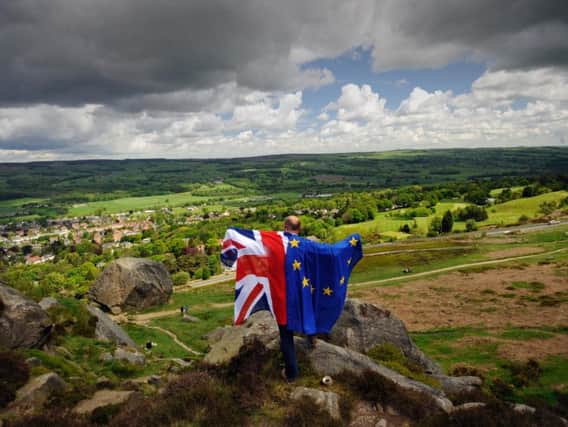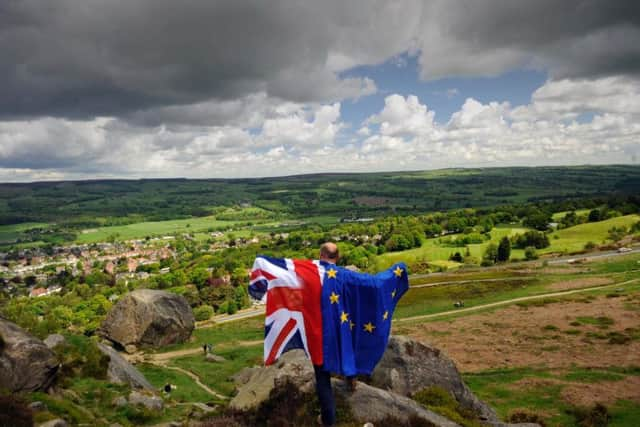EU referendum: Yorkshire and UK vote to leave European Union


In a closely-fought contest, the Leave camp passed the winning post of 16,757,766 with eight of the 382 voting areas still to declare, heading for an overall majority of 52% to 48%.
Ukip leader Nigel Farage declared that June 23 should “go down in history as our independence day”, while Vote Leave’s chair, the Labour MP Gisela Stuart, said it was “our opportunity to take back control of a whole area of democratic decisions”.
Advertisement
Hide AdAdvertisement
Hide AdSterling suffered one of its biggest plunges in the overnight markets, hitting lows last seen in 1985 and losing more than 10% against the US dollar, as traders responded with panic to the prospect of the UK quitting the European Union after 43 years.
With Prime Minister David Cameron expected to address the nation from Downing Street before financial markets opened, Labour said he should “seriously consider his position”, while
Mr Farage said he should resign immediately after voters rejected his passionately-expressed advice to stay in the EU.
Bank of England Governor Mark Carney is expected to make a statement after Mr Cameron.
Advertisement
Hide AdAdvertisement
Hide AdAs polling stations closed at 10pm on Thursday with polls still predicting a Remain victory, 84 pro-Leave Tories - including Boris Johnson and Michael Gove - handed a letter to Mr Cameron urging him to stay on as leader whatever the result of the referendum.


But as Leave built an increasingly unassailable lead as the night wore on, with victories in the Tory English shires, Labour strongholds in the north, Wales and Midlands, others in his party raised questions about Mr Cameron’s future.
Long-standing Eurosceptic John Redwood suggested Tories should wait to see if Mr Cameron was willing to “implement the public will” after a Leave vote.
Mr Redwood said the PM should bring in talent from the Leave side to build “a new government to bind the country together”. And Conservative backbencher Jacob Rees-Mogg said a general election in the autumn was “not impossible”.
Advertisement
Hide AdAdvertisement
Hide AdInfluential backbencher David Davis said the Prime Minister could stay on for a “couple of years” but should put someone else in charge of negotiations on a new relationship with the EU.


Matthew Elliott, Leeds-born chief executive of Vote Leave, said: “Thank you so much to the people of Yorkshire who voted for Vote Leave. Yorkshire was a key part of the country to deliver us this tremendous victory and I am grateful to all of the voters in Yorkshire who gave us victory, especially readers of the Yorkshire Post.”
Paul Nuttall, UKIP’s deputy leader and MEP for the North West of England said: “I think I am going to be surprised by the majority but I am overjoyed. This has been 15 years of hard slog.
"A lot of hard work, a lot of time away from home and it’s all come to this and it’s all been worth it. We’ve got our country back, we can now take control of our destiny, our money, our borders.
“We can put the great back into Great Britain.”
Advertisement
Hide AdAdvertisement
Hide AdYorkshire’s Vote Leave coordinator Andrea Jenkyns said he is ecstatic at the referendum result signalling Brexit.
The Conservative MP for Morley and Outwood said: “I’ve been a staunch supporter of Brexit for years, and I’m absolutely ecstatic that the British public have chosen to Vote Leave and take back control.
“We now begin the process of liberating our country and our government from Brussels and chart our course in the world, independent and free.
“This has been an incredibly hard-fought campaign and emotions have run high on all sides. Now is the time for us to come back together as a Party under the Prime Minister’s leadership and implement the decision of the British people.”
Advertisement
Hide AdAdvertisement
Hide AdOutside Manchester Town Hall cars tooted their horns, while Vote Leave and UKIP’s biggest names are beginning to head down to London to host a series of press conferences.
Speculation has now begun on the liklehood of a second Scottish referendum after the majority of Scots voted to Remain in the UK.
Earlier this morning Nigel Farage said: “I now dare to dream that the dawn is coming up on an independent United Kingdom.”
Every council in Yorkshire to have announced so far - bar Harrogate, Leeds and York - has backed Brexit.
Advertisement
Hide AdAdvertisement
Hide AdThe pound quickly fell from 1.50 to 1.43 against the US dollar as earlier confidence in the markets took a hit.
Sterling’s slide against the dollar has accelerated as Britain appeared to be heading towards the Brexit.
The dramatic fall was described by one analyst as unprecedented, with nearly 10% wiped off the value of the currency since an early rally on the back of a positive opinion poll for Remain.
Shortly after polls closed at 10pm on Thursday the pound rocketed to 1.50 dollars, its highest performance of 2016.
The latest data shows sterling at less than 1.36 dollars.
Advertisement
Hide AdAdvertisement
Hide AdJoe Rundle, head of trading at ETX Capital, said: “We’ve never seen anything quite like this.
“Sterling has dived from a high of 1.50 dollars to below 1.36 dollars in a matter of hours.
“These moves are pretty well unheard of but will only get worse if Leave does win, which it is looking increasingly likely now.”
Turnout in the EU referendum fell narrowly short of the UK record for the total number of people voting.
Advertisement
Hide AdAdvertisement
Hide AdThe Electoral Commission said 72.2% of those registered cast eligible votes - some 33,568,184.
That is just short of the 33,614,074 who decided the 1992 general election.
The highest post-war turnout was 83.9% in the 1950 general election, but a smaller population meant that was only 28,771,124 votes.
In the 1975 referendum on British membership of the then European Economic Community, 25,903,194 people voted - 64.6% of those eligible.